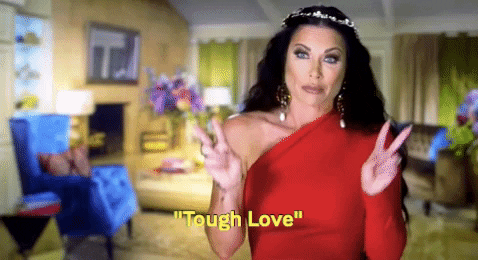
What is tough love? Google defines it as ‘an expression used when someone treats another person harshly or sternly with the intent to help them in the long run’. Now, this type of behaviour might sound familiar to many of us. Some of us might have experienced tough love coming from our parents, teachers, a boss at work, or even our romantic partners. Tough love is generally used in parenting or dealing with addicts. But of course, it is very much present in relationships too and in this article, we’ll be talking about it in the context of romantic relationships.
We got in touch with Ms. Anagha Bhave, a psychologist who is an alumna of St. Xaviers College, Columbia University, New York to help us understand the concept of tough love better. She broke down the negative effects of tough love when practiced in a relationship and explained how tough love ranges from mild to severe. Anagha says that while a certain degree of tough love is important because it can positively influence the relationship like reminding the other person of your self worth or setting clear boundaries—two important factors for a healthy relationship. However, she also emphasised on how tough can have negative effects when practiced excessively. Below are the six main reasons why tough love does more harm than good.

1. Incapable Of Learning
Many times, the practice of tough love reveals that a person uses it because they assume their partner is incapable of learning by showing soft love or affection. They assume that is the only way to make their partner understand something and that being ‘soft’ with them won’t help them learn.
2. Humiliating & Demeaning
As mentioned earlier, when it is used to a certain degree, it can be healthy. But when tough love is used in extreme, it can be very humiliating and demeaning for the person at the receiving end of it. Being treated in a ‘tough’ way in public, or a social gathering, or even if front of friends and family can feel insulting, especially when the other person is your partner.
3. Inability To Be Patient & Kind
This type of behaviour actually doesn’t say more about the person receiving it but it says about the person doing it. Anagha strongly believes that tough love reflects on the person’s own inability to be patient and kind with their partner. Treating your partner with kindness and being patient with them are important factors for a happy, healthy relationship.

4. Create Shame & Guilt
Constant and excessive use of tough love is more likely to create shame and guilt in the mind of the person receiving it. And these two emotions, especially, do not promote healthy self-growth. Being in a constant state of mind of shame and guilt can harm a person’s mental peace.
5. Make Love Seem Conditional
In a healthy relationship, love should come across as unconditional. And excessive tough love can make love seem unconditional, which is very unhealthy in the long run. Making your partner feel that they have to be a certain way to feel loved by you is not a healthy way to go about in a relationship.
6. Increase Stress
Apart from the shame, guilt, and humiliation, tough love can also increase stress for the person receiving it. And too much stress or anxiety in a relationship can push a person to adopt unhealthy coping mechanisms like drugs, alcohol, etc.

7. Poor Empathy
Most importantly, excessive tough love showcases poor empathy! Empathy is very important in a relationship and so if you’re somebody who adopts tough love and excessively so, it probably shows that you’re not really able to understand and share your partner’s emotions. It also shows that you’re too preoccupied with how you feel.
No relationship is perfect, but what makes it worth it is when both the partners work on it. Understanding what is promoting a healthy growth to your relationship and what is making it worse is important.
For more such content, don’t forget to follow @missmalinilifestyle.

